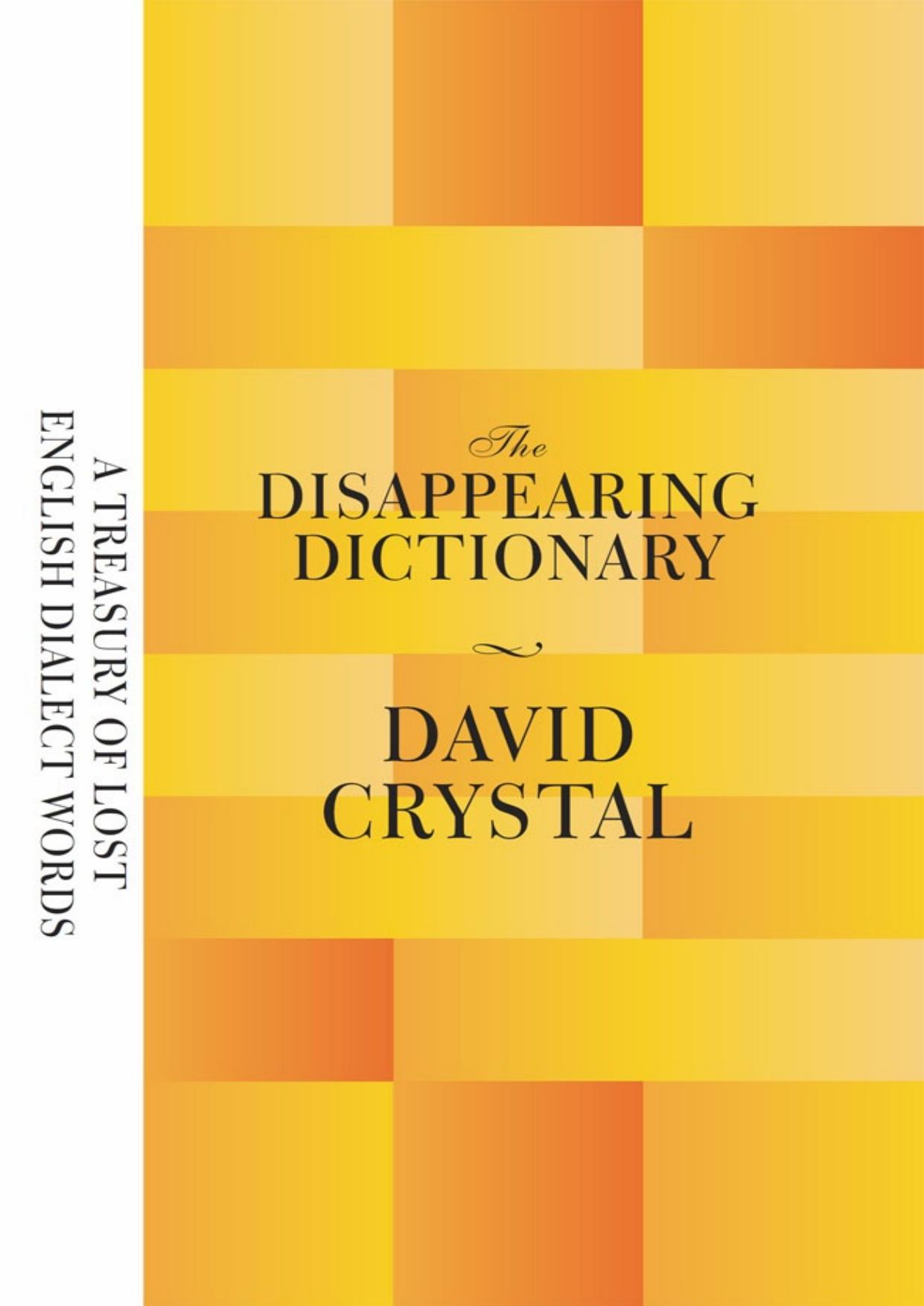The Disappearing Dictionary: A Treasury of Lost English Dialect Words by David Crystal

Author:David Crystal [Crystal, David]
Language: eng
Format: epub, pdf
Tags: Humor, General, Language Arts & Disciplines, Linguistics, Morphology, Spelling & Vocabulary, Syntax
ISBN: 9781447282792
Google: Jp6WBQAAQBAJ
Publisher: Pan Macmillan
Published: 2015-05-21T20:42:32+00:00
N
nang or gnang (verb)
Cumberland, Dorset, Kent, Somerset, Sussex, Westmorland, Yorkshire
Of a pain: to keep up a dull, continuous aching. From Yorkshire: âThis old tooith is gnanginâ at it ageanâ. It could also mean âcomplain, worryâ, like the crying of a fretful child or the continual grumbling of an ill-tempered adult. From Kent: âHe keeps on nanging at meâ. The origin is obscure: it may simply be a variant of nag, with the sound of the ng adding an element of persistence.
nazzard (noun)
Cumberland, Lancashire, Westmorland, Yorkshire
A silly, insignificant, mean person. As with other nouns beginning with n- or a- (see amplush, attercop) people often couldnât decide where to draw the line between the indefinite article and the noun: is it a nazzard or an azzard? The original form seems to be nazzard, as in this Westmorland example: âDidta ivver see sic a wurm itten nazzard iâ thi life?â The origin is obscure. There may be a link with French nez, ânoseâ â perhaps recalling a contemptuous gesture made by flicking or waggling the fingers against the nose (as is still done today).
nesh (adjective)
Cheshire, Cornwall, Cumberland, Derbyshire, Devon, Dorset, Gloucestershire, Hampshire, Herefordshire, Lancashire, Leicestershire, Lincolnshire, Northamptonshire, Northumberland, Nottinghamshire, Scotland, Shropshire, Somerset, Staffordshire, Wales, Warwickshire, Westmorland, Wiltshire, Worcestershire, Yorkshire
Soft to the touch; delicate in health; brittle, crumbly; damp [weather]; dainty, timid. The Old English word for âsoftâ, hnesce, developed a wide range of senses throughout Britain, and entered American dialects too. From Somerset, about beans: âTheyâre too nesh to gather yet awhileâ. From Herefordshire: âThe sheep be doing fairish, but some of the lambs be very nesh this timeâ. If you were nesh-stomached, you had a very delicate appetite. And if you had a timid-looking face, you were nesh-phizzed.
nickerers (noun)
Scotland
New shoes that make a creaking noise. The root of the word is nick, in its sense of âmake a clicking soundâ. In Scotland and the North of England, nick-nack was an alternative name for the tick-tock of a clock. In Cornwall, if you had nickety-knock you were having palpitations. The etymology isnât known. There could be a connection with horses: nicker was used throughout the British Isles to mean âneighâ, and the place in the mouth where the gh sound in neigh was made in Old English is the same as where a k sound was made.
niff (noun)
Cornwall, Devon, Gloucestershire, Shropshire, Somerset, Surrey, Sussex
A silent, sullen feeling of resentment; a quarrel. From Somerset: âLet her alone, herâve oâny a-got a bit of a niff, herâll zoon come oâ that againâ. Someone offended would be niffed or niffy. The source isnât clear. It might have been a variant of sniff. In Sussex niff was used to describe a sniff or smell. It might also have been a variant of miff, âhuffâ.
noggle (verb)
Cornwall, Hampshire, Shropshire, Wales, Yorkshire
To manage anything with difficulty; especially, to walk with difficulty because weak or heavily laden. From Pembrokeshire: âI was main weak, I could hardly walk, but I noggled it somehowâ. The speaker was thus feeling noggly. The word was
Download
The Disappearing Dictionary: A Treasury of Lost English Dialect Words by David Crystal.pdf
This site does not store any files on its server. We only index and link to content provided by other sites. Please contact the content providers to delete copyright contents if any and email us, we'll remove relevant links or contents immediately.
Cecilia; Or, Memoirs of an Heiress — Volume 1 by Fanny Burney(32544)
Cecilia; Or, Memoirs of an Heiress — Volume 2 by Fanny Burney(31942)
Cecilia; Or, Memoirs of an Heiress — Volume 3 by Fanny Burney(31929)
The Lost Art of Listening by Michael P. Nichols(7490)
Asking the Right Questions: A Guide to Critical Thinking by M. Neil Browne & Stuart M. Keeley(5757)
We Need to Talk by Celeste Headlee(5608)
On Writing A Memoir of the Craft by Stephen King(4931)
Dialogue by Robert McKee(4386)
Pre-Suasion: A Revolutionary Way to Influence and Persuade by Robert Cialdini(4219)
I Have Something to Say: Mastering the Art of Public Speaking in an Age of Disconnection by John Bowe(3872)
Elements of Style 2017 by Richard De A'Morelli(3339)
The Book of Human Emotions by Tiffany Watt Smith(3300)
Fluent Forever: How to Learn Any Language Fast and Never Forget It by Gabriel Wyner(3077)
Name Book, The: Over 10,000 Names--Their Meanings, Origins, and Spiritual Significance by Astoria Dorothy(2978)
Why I Write by George Orwell(2944)
Good Humor, Bad Taste: A Sociology of the Joke by Kuipers Giselinde(2941)
The Art Of Deception by Kevin Mitnick(2796)
The Grammaring Guide to English Grammar with Exercises by Péter Simon(2739)
Ancient Worlds by Michael Scott(2682)
